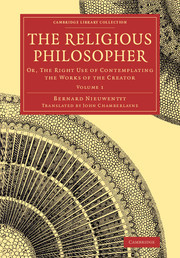Description
The Religious Philosopher
Or, The Right Use of Contemplating the Works of the Creator
The Religious Philosopher 2 Volume Set Series
Author: Nieuwentyt Bernard
Prefaced by: Desaguliers J. T.
Reissued in its 1724 English translation, this two-volume work by a Dutch philosopher influenced the natural theology of William Paley.
Language: English
Approximative price 35.47 €
In Print (Delivery period: 14 days).
Add to cart
Publication date: 11-2014
Support: Print on demand
Support: Print on demand
Description
/li>Contents
/li>
Originally published in Dutch in 1715, this two-volume work by the philosopher and theologian Bernard Nieuwentyt (1654?1718) is reissued here in the 1724 third edition of the English translation by John Chamberlayne (1668/9?1723). The book seeks to persuade both Christians and atheists that scientific examination of the natural world is compatible with religious belief. According to Chamberlayne, Nieuwentyt published this illustrated work to 'magnify the Wisdom and Goodness of God' while challenging those who did not see proof of the divine in nature. The work is known to have influenced the natural theology of the English philosopher William Paley (1743?1805), whose famous analogy of the watchmaker is believed to have been taken directly from Nieuwentyt. Arguing against rationalist philosophers such as Spinoza, Volume 1 defends natural theology and presents a series of detailed 'contemplations' about the complexity of the human body.
The introduction; 1. Of the vanity of all worldly things; 2. Of all that is visible, and of our selves in particular; 3. Of some particulars in the mouth; 4. Of the throat, stomach, and bowels; 5. Of the venae lacteae, and ductus chylicus; 6. Of the heart; 7. Of respiration; 8. Of the structure of the veins; 9. Of the nerves, and briefly of the lymphatick vessels, glands, and membranes; 10. Of the muscles; 11. Of the bones; 12. Of the sight; 13. Of the hearing; 14. Of the senses of tasting, smelling and feeling; 15. Of the union of the soul and body, of the imagination and memory; 16. Of the humane passions or inclinations, and briefly of procreation; 17. Of the air; 18. Of meteors.
© 2024 LAVOISIER S.A.S.




